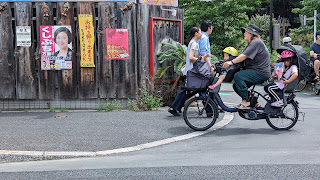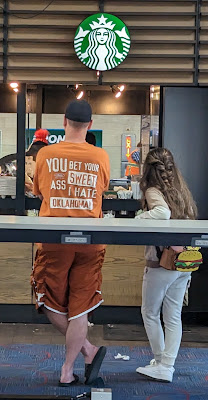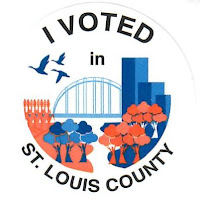I volunteer to serve as an election judge for elections because I think it is important to help assure election integrity. We get paid, but no one works the 15-hour-day plus travel time for the $240. I also do it because it gives me a chance to get out of my social bubble and to meet other people. Sometimes, however, I end up feeling like I should have stayed in my bubble.
This week’s local election in St Louis County had very few items on the ballot. Voters can vote anywhere in the county, so everyone’s ballot can be a bit different, depending on where they live. A few places had mayor’s elections, or school board election, but the ballot for many people only had one question:
Proposition M
Shall St. Louis County impose an additional sales tax of three percent (3%) on all tangible property retail sales of adult use marihuana sold in St. Louis County, Missouri?
□ YES
□ NO
I served in a small town called Black Jack, which is a fairly prosperous African American suburban town in “North County.” We were set up in a school gym. Only 68 voters came during the 13 hours the polls were open, which meant we had a lot of time to sit and wait. That means it cost over $30 per vote just for the cost of election judges at that polling location. Sixty voters voted absentee, so turnout from my polling place was nine percent, half the overall county turnout of 18 percent.
The low turnout is understandable; why bother to vote if there are so few items on the ballot? It is absurd that we have so many elections (often four per year, counting primaries), but it is impossible to change because politicians know that certain items are easier to pass on elections like this, when few people vote, or on presidential elections, when many more people vote, so different groups have an interest in keeping the status quo.
One of the rules for election judges is that we are not supposed to discuss politics. The trainers at the Election Board remind us of this before every election, and yet, people can’t keep their mouths shut. Early in the day, someone started saying something political and our Republican manager commented that we should not talk about politics. Everyone agreed, though Bob, another Republicans poll judge, commented that though we can’t talk here, we SHOULD talk more, because people mostly agree, at least 80%, he said. Mary, a white Republican poll judge, agreed, and added that we are all God’s children, so are basically alike. (I said nothing, and could not help but wonder if my Black fellow election judges agreed, but they also said nothing). Later, as I was standing with him near the scanner, a young Black judge who is Republican said about Proposition M, “Why would anyone vote to give politicians more money so they can just waste it?!” I did not know how to reply without getting political so I just ignored him and said nothing.
Interestingly, two voters commented, when they saw that their ballot only had Proposition M on it, “Of course I’m going to vote “Yes”! I don’t use it, so let those who do pay the taxes!” So even this seemingly innocuous proposition elicited partisan polarization, with conservatives against taxes and liberals in favor of taxes.
In case you were wondering, Proposition M passed, with 65 percent voting "Yes."
We were 8 poll judges, four Republicans and four Democrats, present for nearly 15 hours, and since only 68 people voted, we had a lot of free time. It was a bit like we were characters in the movie The Breakfast Club (except that we weren't all friends at the end), or maybe more like the characters of Murder on the Orient Express, which was being performed as a play this week.
There was Mary, who talked the entire time. She was insufferable. She was from the western rural part of the county, and mentioned that she had lived many years in Mississippi, as perhaps we could tell from her accent. She told us she ran a mission and sold Mary Kay products, and had been in India for 26 days. No one asked why she went to India, but she proceeded to tell us she was there saving people. The last two hours, she literally read the manual and asked us "pop questions" as she read along. "Did you know ‘wearing apparel specific to a candidate or issue’ counts as electioneering?" And 30 seconds later, "What is the correct order for setting up the poll pad?" I made a point of working the scanner, which was at the other end of the gym, so I could be far away from her, where I could only hear her in the background and could read my book.
Then there was Bob, originally from the Bronx, a graduate of the Merchant Marine Academy recently retired after working 40 years in insurance. Hearing I was an anthropologist, he said social scientists will probably be studying the pandemic for decades. I replied that, actually, after the 1918 Flu, people mostly forgot about it, and that there is evidence people are now also ready to move on. He somehow started saying that there was no way Covid came from the market in Wuhan, and that Covid was genetically created in a lab in Wuhan because it was too precisely designed. I did not know how to reply, since he was so vehement, so I cut the conversation off abruptly by telling him he was misinformed and went back to reading my book.
Then there was Republican manager, a white woman about 65 years old, who was very competent and in charge. She managed to make everyone stick to the rule that we not start packing up until AFTER polls close at 7:00 pm. (In previous cases, some people always want to start packing early.) The Democratic manager was a nice Black woman, perhaps 10 years older, who for some reason gave each election judge some cream. She gave me a small vial of Dove face cream for men. Then she asked, “Mr. Joe, do you have bad joints or arthritis?” She said she had some cream from her church that worked very well. I told her I did not need it (yet).
One pair of judges were a kind couple. The husband seemed a bit addled; it took him a while to remember the process for checking people in and producing ballots. He had brought a box of donuts, but they were dated “made March 26, sell by March 28,” so were a week old and stale. Only two of the six were eaten by the end of the day. His wife greeted every voter with a loud, “Welcome to the poll judge sweepstakes! Come on down!” followed by a bellowing laugh. Most people coming in seemed to be amused.
And then we had the young Black Republican, who spent most of the day listing to his iPods, and then suddenly announced two hours before the end of the election that he had to leave. (Hm; I wonder if he’ll get paid.)
At the risk of seeming to be a misanthrope, I have to say the experience was not uplifting. The low turnout, the inability to avoid politics, and the confrontation with partisanship and China-bashing all left me discouraged. Tired after the long day, I came home to make dinner and watch a baseball game. To make matters worse, the Cardinals lost 2-5, losing the third game in the series and thus getting swept by the Braves.







